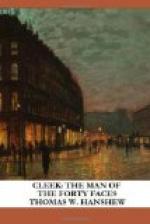“No, your ladyship, in the name of Buddha. Don’t be alarmed. It is only to be a trifling cut—a mere re-opening of that little wound in the thigh which you dressed and healed so successfully at Trincomalee. You made a mistake, all of you, that night when the boy was shot. The native poor Ferralt saw skulking along with the gun was not a mere tribesman and had not the very faintest thought of discharging that weapon at your little son, or, indeed, at anybody else in the world. He was the High Priest Seydama, guardian of the Holy Tooth—the one living being who dared by right to touch it or to lay hands upon the shrine that contained it. Fearful, when the false rumour of that intended loot was circulated, that infidel eyes should look upon it, infidel hands profane the sacred relic, he determined to remove it from Dambool to the rock-hewn temple of Galwihara and to enshrine it there. For the purpose of giving no clue to his movements, he chose to abandon his priestly vestments, to disguise himself as a common tribesman, and, the better to defeat the designs of any who might penetrate that disguise and endeavour to take the sacred relic from him and hold it for ransom, he hid the Holy Tooth in the barrel of a gun. That gun was in his hands, your ladyship, when Ferralt rushed out and brained him.”
“In his hands? Oh, Mr. Cleek, then—then—” Her voice all but failed her as a sudden realization came. “That relic, that fetish! If it was in that gun at that time, then it is now—”
“Embedded in the fleshy part of the boy’s thigh,” said Cleek, finishing the sentence for her. “Inclosed, doubtless, in a sac or cyst which Mother Nature has wrapped round it, the tooth is there—in your little son’s body; and for five whole years he has been the living shrine that held it!”
It was quite true—as events rapidly and completely proved.
Ten minutes later, the trifling operation was concluded; the boy lay whimpering in his mother’s arms and the long-lost relic was on the surgeon’s palm.
“Take it, Captain Hawksley,” said Cleek, lifting it between his thumb and forefinger and carrying it to him. “There is a man in Soho—one Arjeeb Noosrut—who will know it when he sees it; and there is a vast reward. Five lacs of rupees will pay off no end of debts, my friend; and a man with that balance at his banker’s can’t be thought a mere fortune-hunter when he asks for the hand of the woman he loves.”
The Captain didn’t ask for his, however—he simply jumped up and grabbed it.
“By George, you’re a brick!” he said, with something uneven in his voice—something that was like laughter and tears all jumbled up together; then he glanced over at Lady Chepstow, and flushed, and floundered, and stammered confusedly, but went on shaking Cleek’s hand all the time. “It’s ripping of you—it’s bully, dear chap, but—I say, you know, it isn’t fair. It’s jolly uneven. You found out. You ought at least to have a share in the reward.”




